
Apple’s VP of enterprise and government sales leaves company
A short two years after being hired, Reuters is reporting that John Solomon has left his position as Apple’s executive for corporate and government sales.

A short two years after being hired, Reuters is reporting that John Solomon has left his position as Apple’s executive for corporate and government sales.

Following the launch of the current Mac mini in October of last fall, we noted that Apple had removed an option to purchase the entry-level Mac with 2TB of storage. It appears Apple has listened to feedback, and now users can, once again, buy a Mac mini with 2TB of storage. According to our digging into web archives, the 2TB option returned for the priciest Mac mini model in mid-December, right around the Christmas holidays. The 2TB Fusion Drive upgrade costs a $100 more than the 1TB drive, and it requires the machine to be built-to-order. Thanks, Bartosz for the initial find.

 Adding to its list of recent hires, Apple has tapped a former Hewlett-Packard executive to tackle sales of its products to corporations. According to Re/code, John Solomon left his former leadership role at HP to start his new position at Apple and may be involved with international sales of the upcoming Apple Watch in the future.
Adding to its list of recent hires, Apple has tapped a former Hewlett-Packard executive to tackle sales of its products to corporations. According to Re/code, John Solomon left his former leadership role at HP to start his new position at Apple and may be involved with international sales of the upcoming Apple Watch in the future.
Solomon’s LinkedIn profile points to a long career with HP, most recently serving as SVP of Printing & Personal Systems then General Manager of HP’s Consumer Printing Global Business Unit, departing the company in December 2014 and joining a “to be announced” company this month. Re/code reports that Apple has confirmed the hire, but not his specific role or title.
Earlier this week, 9to5Mac reported several key biomedical and fashion industry hires targeted for work around the Apple Watch. As we have reported, Apple has hired several experts from the fitness and health field leading up to the reveal of the Apple Watch in addition to hires from the fashion industry.
While Solomon is reported to be heading sales to corporations and governments, Apple announced a partnership with IBM last year intended to boost adoption of its products, specifically the iPhone and iPad, by various enterprise industries. Apple revealed part of the fruit of that partnership last month when it unveiled apps made with IBM for key enterprise industries including transportation, communication, and government.


Apple has once again retained its top spot in the annual American Customer Satisfaction Index in the personal computers category – though three points down on its 2013 score. Apple has now held top billing for eleven straight years.
The ASCI continues to lump computers and tablets into the same category, so the scores reflect satisfaction with both Macs and iPads. Scores reflect customer expectations pre-sale, perceived quality, perceived value, customer complaint incidents and customer loyalty …
Expand
Expanding
Close


The folks over at Apple Toolbox have shared a number of aerial photos capturing the demolition progress of the future site of Apple’s Campus 2 ‘spaceship’. As you can see above, the former site of Hewlett-Packard that Apple purchased in 2010 is leveling out ahead of the expected 2016 completion date. Campus 2 designer Norman Foster discussed the project’s evolution and Steve Jobs’ involvement earlier this week, and late last month we saw a less clear shot of the plot undergoing demolition. Check below for more detailed photos.


When it first launched in 2005, the Mac mini was almost unimaginably small. The original aim of the machine was to convert owners of desktop Windows machines. Because those people already owned monitors, keyboards and other peripherals, selling them just the computer itself would enable them to switch to Mac for far less than the cost of buying an iMac.
The typical Windows desktop box of that era looked like this:

A system unit that measured just 6.5 inches square and only 2-inches thick was an incredible feat of engineering. Today, however, it looks rather less impressive …
Expand
Expanding
Close

A Harris poll of almost 40,000 American consumers on more than 1,500 brands across 155 categories saw Apple retain Brand of the Year in three categories.
What really stands out is that in all three of the categories Apple brands are measured – Computer, Tablet and Mobile Phone – its Brand Momentum scores are in the top 30 of all 1,500 brands evaluated in the study, showing that consumers see this as a brand of the future.
The poll asks consumers to rate brands on Familiarity, Quality, Purchase Consideration, Emotion, Fit, Trust, Performance, Energy, Ubiquity, Future Outlook, Leadership and Popularity.
The top four brands in each of the three categories were:
Computers:
1 Apple Computers – 2013 Computer Brand of the Year 2 Hewlett-Packard (HP) Computers 3 Dell Computers 4 Sony Computers
Tablets:
1 Apple iPad Series – 2013 Tablet Brand of the Year 2 Kindle Fire Series 3 Google Nexus Series 4 Samsung Galaxy Series
Mobile phones:
1 Apple iPhone – 2013 Mobile Phone Brand of the Year 2 HTC Phone 3 Samsung Phone 4 LG Phone
The ratings may provide some comfort for those who feared Apple’s enviable brand popularity would suffer post-Steve.


HP appears to be taking its If you can’t beat ’em, join ’em design philosophy to something of an extreme with the new HP Envy notebook. A gallery posted by The Verge shows just how closely HP has copied Apple’s MacBook Air designs in almost every respect, from the wedge profile through the chicklet keyboard, trackpad and colors …
Expand
Expanding
Close

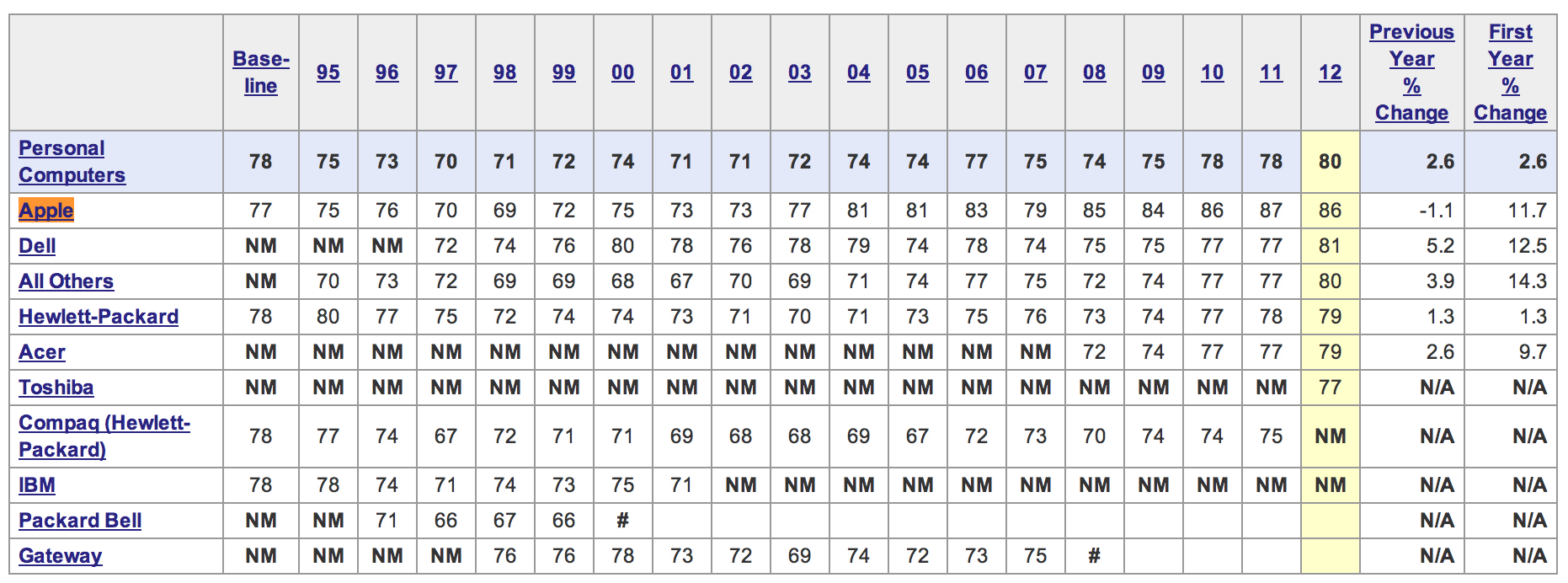
The American Customer Satisfaction Index is out today with its September report for appliances, computers, televisions and video players/recorders. Not surprisingly, Apple is able to maintain its lead among personal computers despite a drop of 1-point to 86 over previous reports. While the report noted Apple continued to lead the category by a margin of 5- to- 9 points, Apple’s lead is slightly smaller than previously, according to the report, “due to an across-the-board customer satisfaction increase for Windows-based computers.” Apple’s score comes as the PC industry as a whole gains 2.6-points and hit all-time high satisfaction score of 80.
Skipping past HP, Acer and Toshiba, the aggregate of smaller PC makers (including tablet producers Samsung and Amazon) improves customer satisfaction by 4% to 80 while simultaneously gaining market share at a pace that outstrips even Apple… “What may be occurring is that the defection of the least satisfied customers of traditional PC brands such as Dell, HP and Acer to Apple and other smaller tablet makers actually may be boosting customer satisfaction for all,” says Fornell. “The companies that lose market share will maintain their most loyal and happy customers, while those who migrate to other companies in search of new products are more pleased as well.”

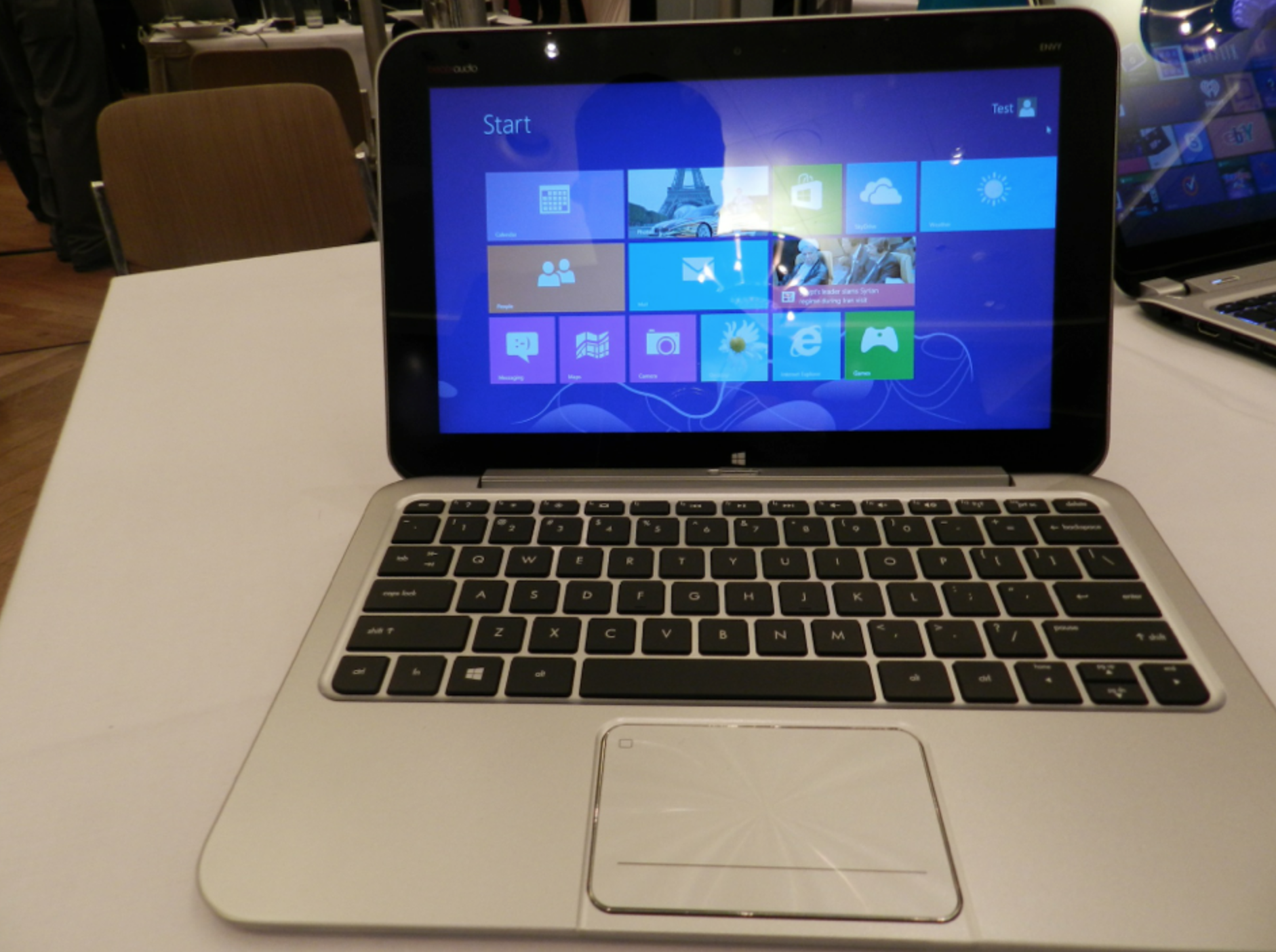
The Wall Street Journal has a story today on HP CEO Meg Whitman “taking a cue from Apple” and planning to release a redesigned line of PCs that could one day rival Apple. While mentioning the “brick” of a company laptop she received when taking over as CEO in September 2011, Whitman discussed the company’s struggle to keep up with Apple’s product design:
As part of her plan, Ms. Whitman is counting on better-looking PCs, hoping her company might one day rival Apple Inc. as the industry’s standard bearer for sleek design…”I don’t think we kept up with the innovation,” said the 56-year-old CEO. “The whole market has moved to something that is more beautiful… Apple taught us that design really matters,” she said. “I think we’ve made a lot of progress.”
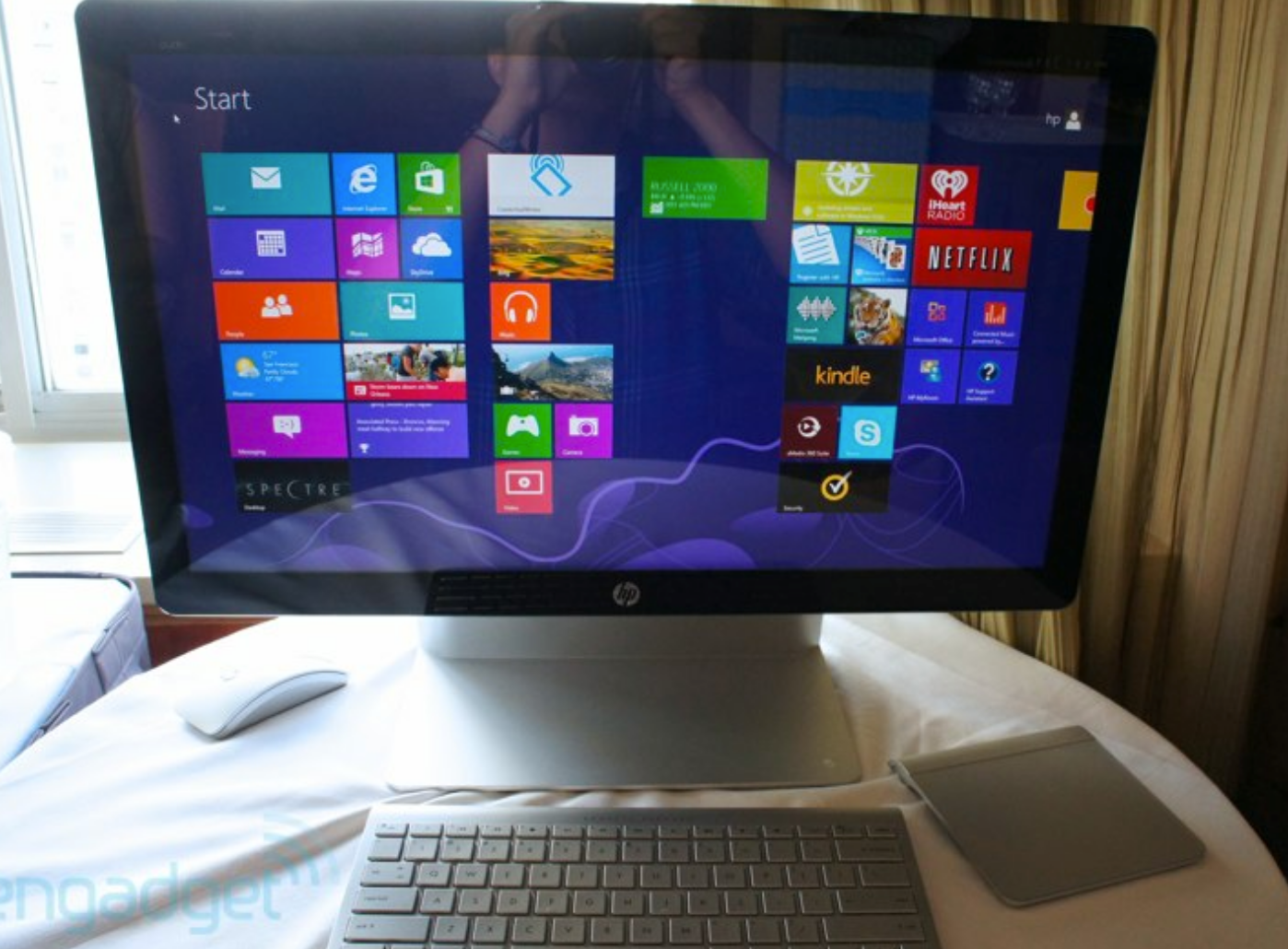
HP executive Stacy Wolff is behind the new look, which he explained uses a common color palette, standard logo size, and reduced components “so that a computer’s chassis, for example, was a single piece of metal or plastic, instead of multiple pieces.”
Not only did the change make the products look better-built, but it sometimes made them cheaper or lighter…”We’re working on a cleaner, more minimalistic look,” he said.
We already got a look at HP’s sleeker [MacBook Air] look with its new Windows 8 notebooks at IFA (pictured above) and recently announced iMac with Magic Mouse and Magic Trackpad (pictured right)…
Expand
Expanding
Close

It feels like consumer PC hardware can now be defined thusly: “Make something as close as possible to an Apple product without getting sued.”
HP’s Spectre One comes with accessories that look and act almost identical to Apple counterparts including the wireless keyboard, trackpad and mouse. The screen looks like a Cinema Display with HP pasted over the Apple. The only difference is the back (which few will see).
Perhaps manufacturers are learning the wrong lesson from Samsung. Although Engadget did not notice (or mention) any resemblance beyond the “Magic Trackpad style,” just about every commenter did. Update: Engadget Editor Tim Stevens says it was too obvious to mention:
[tweet https://twitter.com/tim_stevens/status/245136336883965952]
[tweet https://twitter.com/stroughtonsmith/status/245118820098920448]
What say you? Homage or Rip-off? (Also: What is Kirf?)
Expand
Expanding
Close

[youtube=http://www.youtube.com/watch?v=C5z0Ia5jDt4]
Creator of Apple’s “Get a Mac” ad campaign, Scott Trattner, is leaving his role as executive creative director at TBWA/Media Arts Lab. He was responsible for the creative development of many Apple product ads from the iPod, iPhone and iPad to Mac, iTunes and iCloud. According to Ad Age, after years of focusing mostly on Apple campaigns at TBWA/Media Arts Lab, Trattner will take a new role at 72andSunny to work as one of three creative directors with clients, including Samsung, Xbox 360, Hewlett-Packard, Activision and Nike.
“Scott’s track record for creating colossal impact on behalf of his clients is second to none,” said 72andSunny CEO John Boiler in a statement. “His work has not only shaped one of the biggest brands in the world, but redefined industries.”
Most notably, 72andSunny was responsible for Samsung’s “Next Big Thing” Galaxy S II campaign that “launches the Samsung Galaxy S II by challenging blind allegiance to Apple’s inferior products”. 72andSunny is also behind many Call of Duty ads and campaigns for other Activision games.
Apple’s most recent ads featuring Apple Genius Bar employees, which aired during the Olympic Games in London, were not well received due to their lack of focus on an actual product and the fact they assumed customers were not knowledgeable. Apple later removed the videos from both their website and YouTube channel.

We are starting to see the “Cars and Trucks” model unfold as PC sales are starting to slip dramatically.
Among the top 5 vendors in the U.S. PC market, all but Apple experienced a decline in shipments according to a Gartner report late this evening. This is not your average “Apple beat the PC industry every quarter for the past 5 years.” It is a dramatic fall. Apple pulled to within 500,000 units of Dell from double that a year ago.
A few notables:
Expand
Expanding
Close

A Goldman Sachs executive apparently dabbled in a bit of insider trading when he allegedly discussed non-public information about Apple Inc., to a prominent hedge fund manager during a federal wiretap investigation.
David Loeb, who is head of Asia equity sales for Goldman Sachs Group Inc., in New York, was supposedly caught on a U.S. wiretap providing inside information on Apple Inc., Intel Corp., and Hewlett-Packard Co., to Raj Rajaratnam, the founder of Galleon Group, a New York-based hedge fund management firm. Rajaratnam is now serving an 11-year prison sentence for insider trading.
Today’s wiretap tidbit emerged after Gary Naftalis, a lawyer for Rajat Kumar Gupta, told a judge about the tapes’ existence. Gupta is an ex-Goldman Sachs director arrested in late 2011 by the FBI on insider trading charges derived from the Raj Rajaratnam Galleon Group case, and he is currently embroiled in an ongoing criminal trial. Gupta adamantly denies any misconduct.
According to Bloomberg (via Crain’s New York):
- ‘He’s on a tape giving out information’ about those companies, Mr. Naftalis told U.S. District Judge Jed Rakoff outside the presence of the jury.
- Mr. Naftalis told the judge that prosecutors were withholding exculpatory evidence he said could help his client.
- […] Assistant U.S. Attorney Reed Brodsky told Judge Rakoff that Mr. Loeb “provided Intel, Apple and Hewlett Packard information to Mr. Rajaratnam.” It’s the first time the government has publicly named Mr. Loeb and confirmed that the U.S. has evidence that he gave information about Apple, Intel and Hewlett-Packard to Mr. Rajaratnam.
- “There’s none that Mr. Loeb had access to material, nonpublic information about Goldman’s earnings,” Mr. Brodsky said.
Loeb has not been formally accused of any crime.

A new report from business weekly Barron’s (via Reuters) claimed The Dow Jones Industrial Average stock index could potentially replace stocks from Alcoa, Bank of America, or Hewlett-Packard with Apple or Google. There’s no exact timeframe for the overhaul of the index, but Barron’s said adding the companies would be complicated due to the fact the Dow calculates the absolute price of shares. Reuters explained that getting Apple would require the company to split its shares:
Apple, whose shares on Friday closed at $603, would overwhelm the index with a 26 percent weighting. That is double the influence of current Dow component IBM, whose $207 stock price gives it a 12 percent weighting in the index, Barron’s said.
Barron’s said the heavy weighting that Apple would command at its current share price could prove a barrier to becoming a Dow component. To guarantee a Dow spot, Barron’s said, Apple would have to split its shares by five-for-one or 10-to-one. But Barron’s noted that Apple has not split its stock since 2005.

It is interesting how little Verizon has to provide, yet the splash page they put up today still screams “iPad!”.
Notably, the graphic image file name is:766x385_HP_pre_NO_optin.jpg but somehow we don’t think Verizon’s big surprise is the recently discontinued HP Pre.
Update: Now AT&T has their version up:

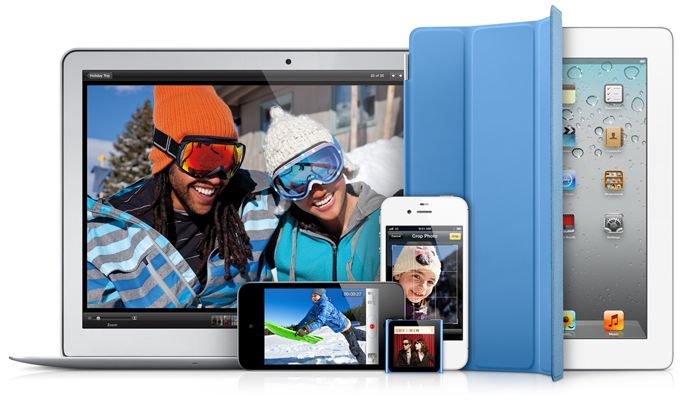
Apple’s $46.33 billion dollar holiday quarter and the 73+ million shipped Macs and iOS devices are clear standouts in the newest NPD research note exposing Apple as the only brand to have grown sales in the all-important holiday quarter. The same cannot be said for rivals Hewlett-Packard, Samsung, Sony, and Dell, which all experienced missteps in holiday-quarter gadget sales. Five consumer electronics categories (PCs, TVs, tablets/e-readers, mobile phones and video game hardware) drove nearly 60 percent of all sales in 2011. Apple’s share of total revenue across these five important categories rose 36 percent year-over-year, according to NPD.
As a result, Macs, iPhones, iPods, iPads, Apple TVs and the company’s other consumer electronics gear accounted for 19 percent of all sales dollars. That is almost twice as much as No. 2 Hewlett-Packard. HP’s, Samsung’s, Sony’s and Dell’s sales dipped 3 percent, 6 percent, 21 percent, and 17 percent, respectively. Apple Retail was No. 3 in terms of revenue, right after No. 1 Best Buy and second-ranked Walmart. Staples and Amazon tied for fourth place to round out the top five—a repeat of 2010.
By the way, did you notice which two consumer electronics categories lack a dedicated Apple offering?


Research firm Gartner just released its estimates for PC shipments in the Western Europe region during the holiday quarter, and only Apple and Asus made any meaningful progress, with Apple recording the strongest gains in France and the United Kingdom.
While the Mac maker remained absent from the Top 5 rankings in Western Europe and Germany, it was a sole first-tier PC brand to grow sales in the United Kingdom during the holiday quarter. Specifically, Apple’s Mac business in the country grew 17.2 percent, enough to rank fourth with a 9.1 percent market share.
Everyone else’s business shrunk: Hewlett-Packard (No. 1) was down 27 percent, Dell (No. 4) declined by a whopping 32.2-percent, Toshiba (No. 3) fell 5.4-percent and Acer (No. 5) was by far the biggest loser with a 62.4-percent year-over-year decline. The same story is in France where Apple placed No. 5 by growing 15.3-percent for an 8.2-percent market share. Only Asus (No. 2) grew slightly faster than Apple at 17.4-percent, while shipments of PC desktops and notebooks from HP, Acer, and Dell plummeted.
If you include the iPad, Apple easily beats its rivals to the PC punch across the board.
More notes and charts are after the break.
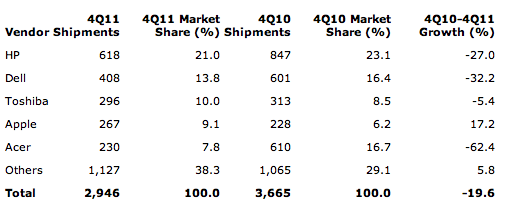
Shipments of notebook and desktop PCs in the United Kingdom. Source: Gartner, February 2012

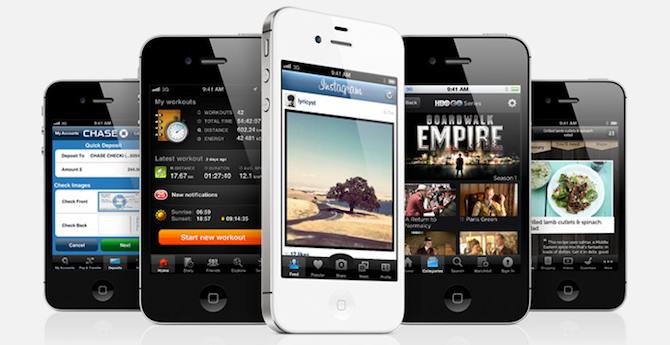
Apple announced monster sales of 37 million iPhones yesterday for the holiday quarter that spanned 14 weeks and ended Dec. 31, 2011. It’s a 128 percent unit increase and 133 percent revenue increase, annually, and enough to knock Samsung off the No. 1 spot it briefly held in the previous quarter. However, it appears that the popularity of the iPhone 4S also helped Apple thrive over Google’s platform, especially with Android backers such as Motorola Mobility, HTC and Sony Ericsson reporting disappointing results.
According to research firm Kantar Worldpanel ComTech (via Reuters), iPhone sales gave iPhone a lead over Android in smartphone sales in the United States. Specifically, Apple’s share of the U.S. market during October to November of last year doubled from 22.45 percent a year ago to 44.9 percent. Meanwhile Google’s Android smartphones dropped from 50 percent to 44.8 percent in the same period. Kantar’s global consumer insight director Dominic Sunnebo:
Apple has continued its strong sales run in the U.S., UK and Australia over the Christmas period. Overall, Apple sales are now growing at a faster rate than Android across the nine countries we cover.
Another way to look at iPhone numbers: The iPhone business generated $24.42 billion revenue. During the same quarter, all of Microsoft raked in $20.89 billion revenue. In fact, all of Apple’s holiday-quarter revenues and profits were two times higher than Microsoft’s.
Yet another look at iPhone numbers: Apple sells more iPhones in a day than babies born.

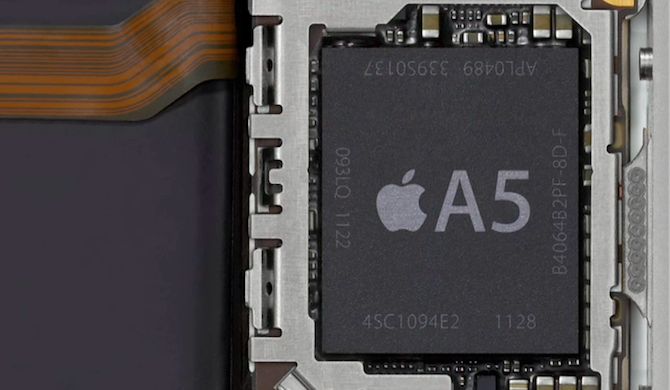
With the growing sales of Apple’s mobile devices and the ever-increasing popularity of smartphones (analysts projected 30+ million iPhones for today’s holiday quarter earnings call), it is no surprise that the Mac-maker is rising up the chip-purchasing ladder. According to research firm Gartner, Apple is now the world’s largest buyer of silicon parts, spending an astounding $17 billion on semiconductors in 2011 and accounting for a 5.7 percent share of total silicon buying.
That’s a 34.6 percent increase over 2010— enough to jump two spots ahead of rivals Samsung and the world’s leading computer maker Hewlett-Packard (soon to be displaced by Apple). Apple’s rise stems of strong sales of iPads, iPhones and its popular MacBook Air ultra-portable notebook family. Samsung ranked second with $16.7 billion worth of semiconductors in 2011, a 5.5 percent share. Computer makers Hewlett-Packard and Dell and cell phone giant Nokia round up the list of top five chip buyers with $16.7 billion, $9.8 billion and $9 billion worth of silicon parts, respectively.
![]()


Counting tablet PCs as personal computers, Apple is about to overtake Hewlett-Packard and become the world’s top personal computer vendor. All should be known soon when Apple reveals holiday quarter earnings in a conference call with analysts scheduled for Tuesday, Jan. 24.
HP CEO Meg Whitman was first to admit that such a turn of event neither would nor be entirely unsurprising given Apple’s lead in the post-PC world. Whitman said back in November, “It’s possible if you integrate tablets.” Fortune’s Philip Elmer-DeWitt wrote that, based on a poll of 42 analysts, iPad sales could hit the 14 million mark, a notable increase over the 11.12 million iPads sold during the September quarter.
Fortune’s estimates range from 11.7 million (Hendi Susanto of Gabelli & Co) to 19.47 million iPads (Alexis Cabot of the Apple Finance Board). According to research firm Gartner, HP shipped 14.7 million PCs in the last quarter, down 16 percent from a year ago.
Now, Apple in this last quarter cleared 4.89 million Macs, and its holiday sales are estimated to exceed 5 million units. Combined, iPad and Mac will have sold over 20 million units during the holiday quarter, enough to give the Cupertino, Calif.-based technology powerhouse a few million units lead over HP, the world’s leading computer vendor.
Estimated unit sales translate into a 17.6-percent market share for Apple versus 13 percent for HP, representing a landmark achievement by any measure. Again, that’s assuming tablets are counted as personal computers. As noted by Asymco’s Horace Dediu, Apple has never held the top spot. Its Apple II system peaked at 15.8 -percent share in 1984 and the Mac peaked at 12 percent in 1992. Interesting that Lenovo CEO praised Apple last week, saying about Android on tablets that “We still need to learn something, we still need to improve something”.

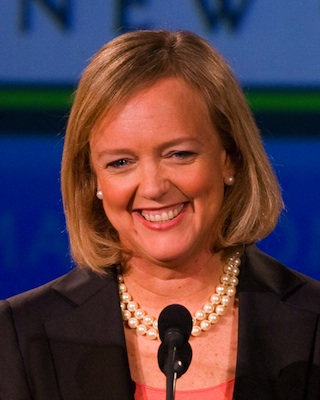
Meg Whitman, 55, a former eBay CEO and the president and chief executive officer of Hewlett-Packard since September 2011, has no doubt in her mind that Apple stands a chance of zooming past Hewlett-Packard, the world’s leading computer vendor, some time during next year.
Whitman’s appraisal of Apple assumes, of course, that one considers tablets, such as Apple’s iPad, personal computers.
Commenting on a recent Canalys survey that first predicted Apple’s likely takeover of Hewlett-Packard with a little help from the yet unreleased iPad 3, Whitman told French newspaper Le Figaro (machine translated):
Yes. I think it’s possible if you integrate tablets. Apple does a great job. We need to improve our game and our products to take over the leadership position. Apple could go past HP in 2012. We will try to become the champion in 2013. It takes time for the products on which I have come to influence the market.
Hewlett-Packard is the world’s leading computer vendor, operating in nearly every country. More interesting than that, Whitman said her company will reach a decision soon on the fate of the webOS mobile operating system, which has remained in turmoil after HP indicated it might sell of that asset. She reassured Hewlett-Packard fans that her company is open to all options and nodded at Android as one of the choices being considered.
According to TechCrunch, she said:
Expand
Expanding
Close

Well, he’s made at least one good decision in the past few years.
Expand
Expanding
Close

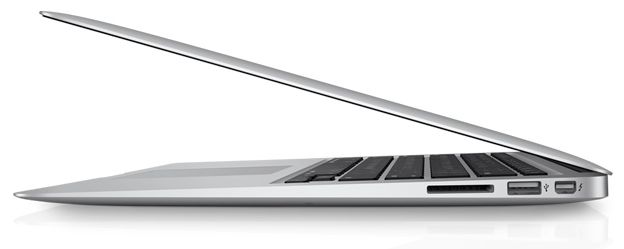
Research firm Canalys on Monday said it expects Apple to overtake Hewlett-Packard to become the world’s leading PC maker before the second half of 2012. That is, if you count tablets as computers (many people don’t). The launch of iPad 3 early next year is predicted to boost Apple’s share of the global PC market. Canalys Analyst Tim Coulling:
Apple has seen its PC market share expand from 9 percent to 15 percent in just four quarters, though iPad shipments in its core market – the United States – are likely to come under pressure in Q4 due to the launch of the Fire and Nook at extremely competitive price points.
Charlie Wolf of Needham and Co last week said the Mac passed the magic five percent global market share. Canalys’ data includes computer and tablet sales. Earlier this month Canalys pegged Apple’s share of the global PC market at 15 percent, right behind the #1 HP with 16 percent share. CAnalys predicts that 2011 PC sales will grow 15 percent to hit 415 million units, of which 211 million should be notebook units where Apple absolutely dominates.
Ultrabooks? “For Ultrabooks to become widespread, prices have to drop considerably”, Canalys said. As for other tablets, DigiTimes expects high inventory levels of non-Apple tablets following the holiday season. This is partly due to the launch of the Kindle Fire and Nook Tablet which undercut other Android tablets, meaning “several waves of price cuts are expected in the new year”. Meanwhile, white box tablets, which dropped below $100, are not expected to affect iPad sales.
Expand
Expanding
Close